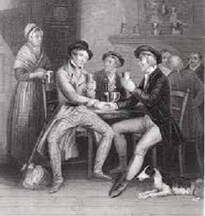Auld Lang Syne
 Should auld acquaintance be forgot,
Should auld acquaintance be forgot,and never brought to mind?
Should auld acquaintance be forgot,
and auld lang syne?
Original Scots verse by Robert Burns
Auld Lang Syne is a Scots language poem written in 1788 by Robert Burns (1759 – 1796). The poem is set to the tune of a traditional folk song. In many English-speaking countries, the song is most often sung on New Year’s Eve; however, it is common to hear the song at funerals, graduations, and on other occasions celebrating the close or end of something significant.
The word auld (old) is from 14th century Scottish. The term lang syne (long ago) is Scottish from around 1500. A langsyner was a person who lived long ago. Syne, a Scottish form of the word ‘since’, is from around 1300.
There are several English translations of auld lang syne; for example, old long since, long long ago, days gone by, old times, for the sake of old times, but the most common translation appears to be ‘old times sake’.
For a time during the religious turmoil of 17th century Europe, New Year’s was the main mid-winter festival in England and Christmas was banned as a ‘popish’ festival. In England, this ban remained in effect only until 1660.
However, in Scotland, Christmas was not officially celebrated for the next three hundred years. During this period, New Year’s remained the main mid-winter festival and the singing of Auld Lang Syne became part of these celebrations. Christmas did not become an official holiday in Scotland until 1958.
And, if you’re wondering about the tradition of crossing your arms and holding hands with the people around you while singing, this comes from a tradition of the Masonic Lodge of which Robert Burns was a member.
Reference: Online Etymological Dictionary, https://www.etymonline.com/
https://www.bbc.com/news/uk-scotland-59838057
https://en.wikipedia.org/wiki/Auld_Lang_Syne
Published on December 31, 2022 09:38
No comments have been added yet.



